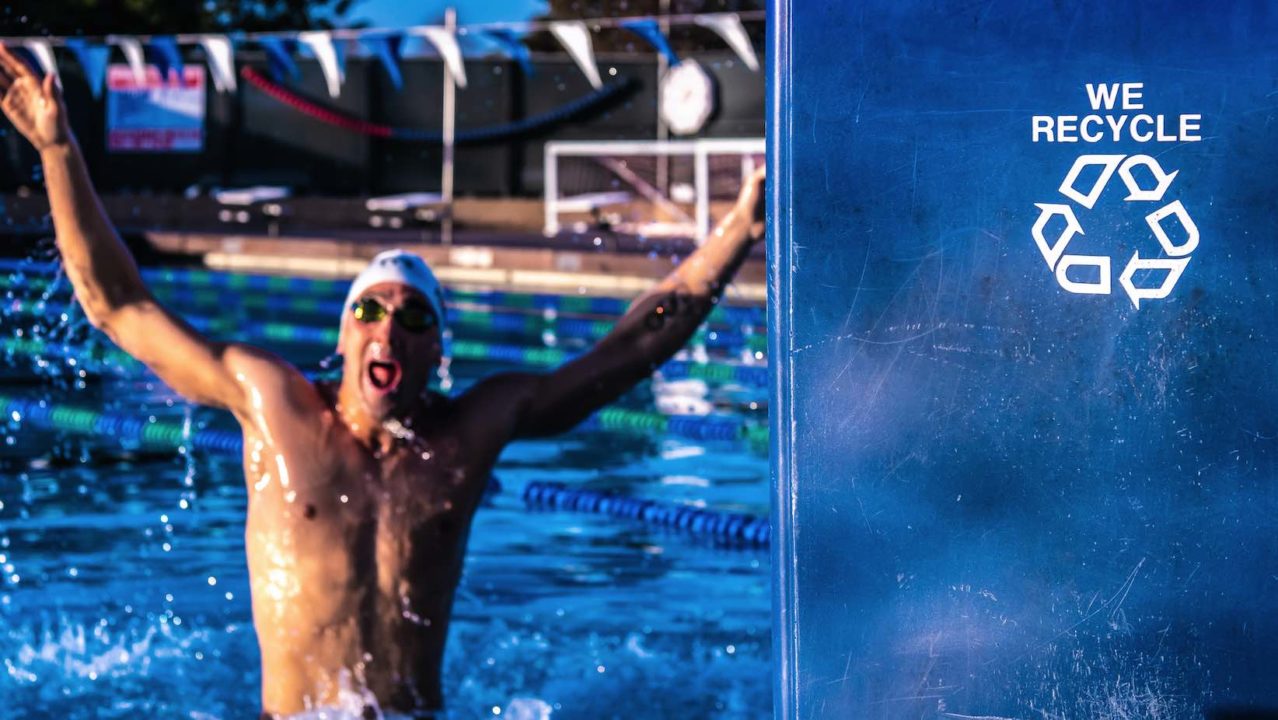With the world shutting down, we’re reaching into our archives and pulling some of our favorite stories from the SwimSwam print edition to share online. If you’d like to read more of this kind of story, you can subscribe to get a print (and digital) version of SwimSwam Magazine here. This story was originally published in the 2019 Spring edition of SwimSwam Magazine.
By Alexandra Criscuolo
You’ve probably seen the ubiquitous #EveryDropCounts ad that features Michael Phelps encouraging viewers to turn off the faucet while brushing their teeth. Limiting water use is just one of the many things that can make swim meets more sustainable.
Swim meets, from small summer leagues to the Olympic Trials, can have a negative effect on the environment — picture stands filled with trash at the end of the day, or all the carbon emissions from participants driving to the pool. Taking certain steps can significantly reduce this impact.
Share the following tips with your teammates, coaches, parents, conferences, and leagues:
- Encourage teams to use reusable water bottles.
- Provide coolers with water for athletes and coaches to refill their bottles.
- Sell branded stainless-steel water bottles for those who forgot theirs.
- Have fun encouraging water conservation.
- Phelps encourages fans to turn off the faucet while brushing their teeth to save up to 8 gallons of water per day. Post a photo of Phelps with the hashtag #EveryDropCounts in locker rooms to remind swimmers to take shorter showers and ensure all faucets are turned off.
- Decrease carbon emissions.
- Encourage teams to carpool, take public transportation, or use ride-share services.
- Stock the food stand with locally sourced items that don’t have to be shipped long distances. Providing locally grown food often means healthier options for athletes.
- Limit waste that ends up in the landfill.
- Make recycling bins stand out by decorating them with bright colors and labeling them with clear instructions and signage.
- Provide an option to compost items like food scraps, tea, and shredded paper bags so they can be used to enrich the soil and reduce methane emissions from landfills.
- Ensure that untouched food is distributed to those in need.
- Limit paper waste.
- Deliver programs by email or post them online instead of providing hard copies (and save printing costs while you’re at it!).
- Use the Meet Mobile app to provide heat and lane information as well as real-time results.
- Provide mobile tickets instead of printed tickets or single-use wristbands that end up in landfills.
- Conserve energy.
- Turn off all electronics (like computers, timing systems, and lights) before leaving the facility for the night, and turn down the heat, which will also decrease energy bills.
- Use volunteers.
- In addition to volunteer timers, clerks of course, awards distributors, and runners, enlist sustainability volunteers to collect and organize recyclables from the stands, direct participants to recycling bins, and turn off lights and electronics at the end of the day like MLB’s “Green Teams.”
- Limit gear waste.
- Technical racing suits have short lives, frustrating environmentally conscious swimmers like Kaitlin Sandeno. “Swimmers go through their bathing suits so quickly … You can only race in the suit one to three times and then you get rid of it,” the four-time Olympic medalist said on an upcoming episode of the “Impact Report” podcast. Swimmers should invest in durable, long-lasting swimsuits, gear, bags, and apparel to reduce waste over time.
- Choose suits and gear that are upcycled (made from used items or waste material), such as Speedo’s suits made with fabric scrap or Adidas apparel made from ocean plastics.
- Donate gently used items so other athletes can use them.
By following these tips, you might help your pool and your team save money otherwise spent on energy bills, apparel, and printing. You might even save hundreds of single-use plastic water bottles from ending up in the landfill.
Alexandra was a Division I swimmer at Fairfield University and is pursuing her MBA in sustainability at Bard College. She can be reached at [email protected], and you can follow her on Twitter @AlexandraCrisc.

Wow, that’s quiet a list. I guess while we are at it we could do the following things:
-Limit pool depth to 4ft and length to 25yds
-Mandate all pools are covered to limit evaporation
-Stop heating the pool
-During a multi-day meet limit yourself to a single change of clothes as not to waste water/energy when you get home washing them
-Do away with luxuries such as electronic timing, lights, heat/cooling and cameras
-Limit audience to one per participant and reduce number of judges to one…..they are emit carbon
-Concessions should only sell organic plant based refreshments or water from the tap
-ban googles and caps, they aren’t recycled and have… Read more »
hahaha, it is ironic because environmentalists have to concede that filling pools with water isn’t the most conscious thing to do.